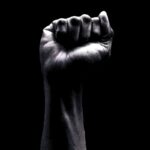Gabon Soldiers Seize Power Shortly After Controversial Election
Celebrations and Gunfire Follow Announcement of Military Takeover
Military officers in Gabon made a surprise appearance on national television on Wednesday, declaring their seizure of power just moments after President Ali Bongo Ondimba was declared the winner of a disputed election. The officers, claiming to represent the “defense and security forces” in the country, announced their decision to “put an end to the regime in place” in a televised address on news channel Gabon24. The broadcast also stated that the election results would be nullified, and the country’s borders would be closed. Gunfire was reported in the capital city, Libreville, as celebrations erupted on the streets.
It is important to note that CNN has been unable to independently verify the video and has not been able to reach the Gabonese government for comment. However, videos shared with CNN and posted on social media show jubilant residents celebrating and waving the Gabon flag, chanting “liberated!” in the capital city. This is not the first time Gabon has faced turmoil and unrest over President Ali Bongo Ondimba’s rule, with previous power struggles and protests erupting in 2016.
A Trend of Military Coups in African Countries
The military takeover in Gabon follows a worrying trend in the region, with five countries in western and central Africa experiencing military juntas in the past three years. Mali, Guinea, Burkina Faso, Chad, and Niger, all former French colonies, have seen their democratic progress undermined by these coups. The African Union suspended Niger’s membership after its military junta seized control of the country in late July, prompting concerns about stability in the region.
French Prime Minister Elisabeth Borne expressed France’s close monitoring of the situation in Gabon, emphasizing the need for a comprehensive discussion among defense and foreign ministers to devise a better approach toward these countries.
Ali Bongo’s Long Rule and Contested Election
President Ali Bongo Ondimba, 64, took over from his father, Omar Bongo, in 2009 after his father’s death. Omar Bongo had ruled Gabon for nearly 42 years, establishing a one-party system and only allowing multi-party rule in 1991. Despite the transition to multi-party democracy, his party maintained a tight grip on the government. Ali Bongo, a former foreign minister and defense minister, won this week’s election with 64.27% of the vote. His main challenger, Albert Ondo Ossa, secured 30.77% of the vote.
The opposition had raised concerns about electoral irregularities, and international observers noted a lack of transparency during the election. These factors heightened tensions in the lead-up to the election, prompting opposition supporters to call for change in the poverty-stricken nation.
The Implications of the Military Seizure of Power
It is yet to be seen how the international community will respond to the military takeover in Gabon. The African Union’s suspension of Niger’s membership suggests that such actions are met with consequences. However, the situation in Gabon underscores the fragility of democracy in the region and raises questions about the effectiveness of international efforts to support democratic progress.
The Gabonese government’s obstruction of foreign press coverage during the election has also drawn criticism from organizations like Reporters Without Borders. Democracy requires transparency and media freedom, and the international community must hold governments accountable for any infringements on these principles.
The Path Forward: Stability and Democracy
The military takeover in Gabon highlights the urgent need for stability and democratic governance in the region. While it is tempting for some to resort to military force to achieve change, it only perpetuates the cycle of unrest and instability. Sustainable progress can only be achieved through the establishment of democratic institutions, respect for the rule of law, and the protection of human rights.
The international community, particularly regional organizations like the African Union, must play a crucial role in supporting countries in transition and ensuring that democratic values are upheld. This includes providing assistance in election monitoring, promoting transparency, and fostering dialogue among political actors.
Civil society also has a vital role in advocating for democratic principles and holding governments accountable. Organizations and individuals committed to democratic governance should actively engage in promoting dialogue, advocating for reforms, and strengthening democratic institutions.
In Gabon, a peaceful and inclusive path forward is essential to avoid further violence and conflict. The military must be persuaded to return power to civilian authorities, and a process of national dialogue should be initiated to address grievances and ensure democratic governance. The Gabonese people, neighboring countries, and the international community must work together to support the restoration of stability and democracy in Gabon and the region as a whole.

<< photo by Flo Lorenz >>
The image is for illustrative purposes only and does not depict the actual situation.
You might want to read !
- Gabon Army Officers Stage Coup in Aftermath of Controversial Oil-Driven Election
- “14th May 2023: A Crucial Decision for Indigenous Representation in Australian Politics”
- “Gadsden Flag Controversy Erupts: Colorado Springs School Under Fire”
- The Rise of the Boomer Generation – Redefining the Global Stage
- Australia’s Battle with Hurricane Idalia Intensifies: Latest Update #4
- “Battling Alex de Minaur Triumphs in US Open Opener Against Timofey …”
- “12 Years Later, Amy Winehouse’s Family Reveals Untold Stories of Her Life”
- Warrandyte byelection: Liberals declare triumph as Nicole Werner takes the winning seat
- Spanish Queen Joins In Celebration of Team’s World Cup Win, While British Royals…
- Spanish Queen’s Devastating Snub Leaves William Stunned




